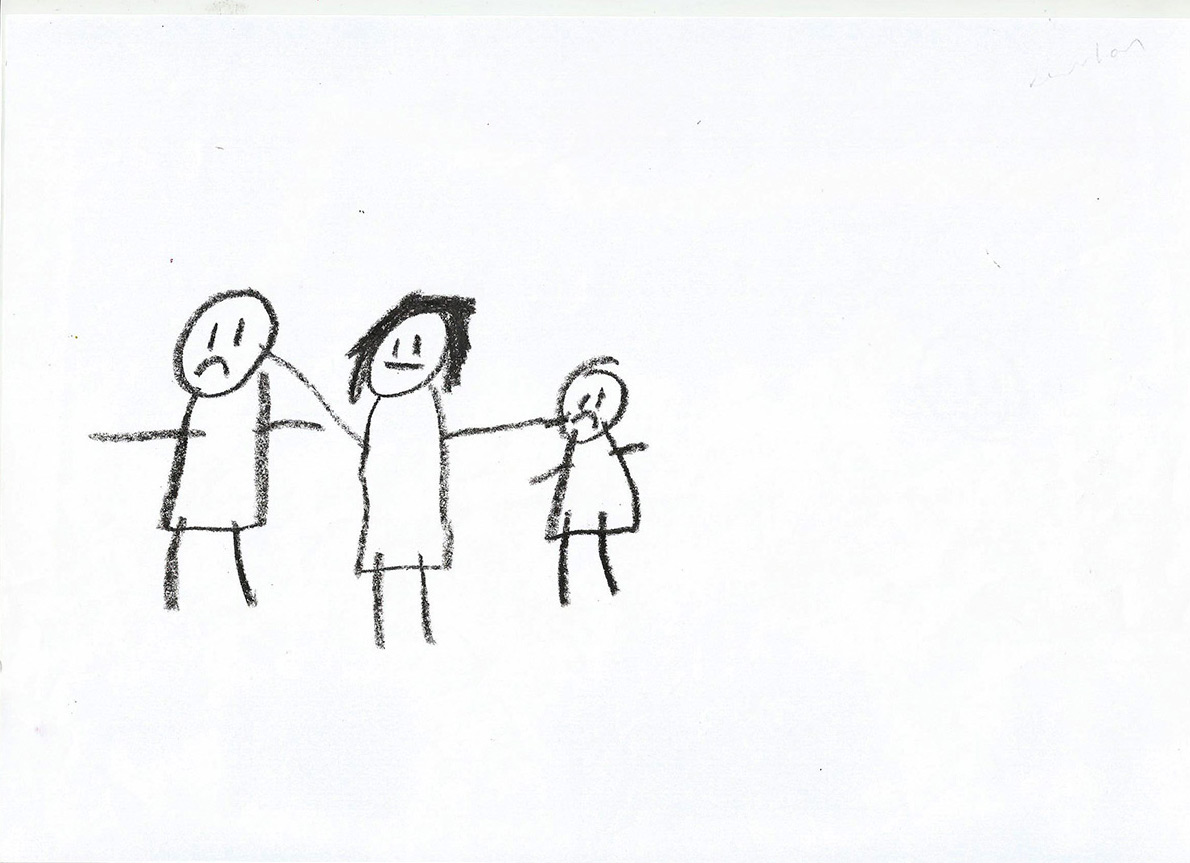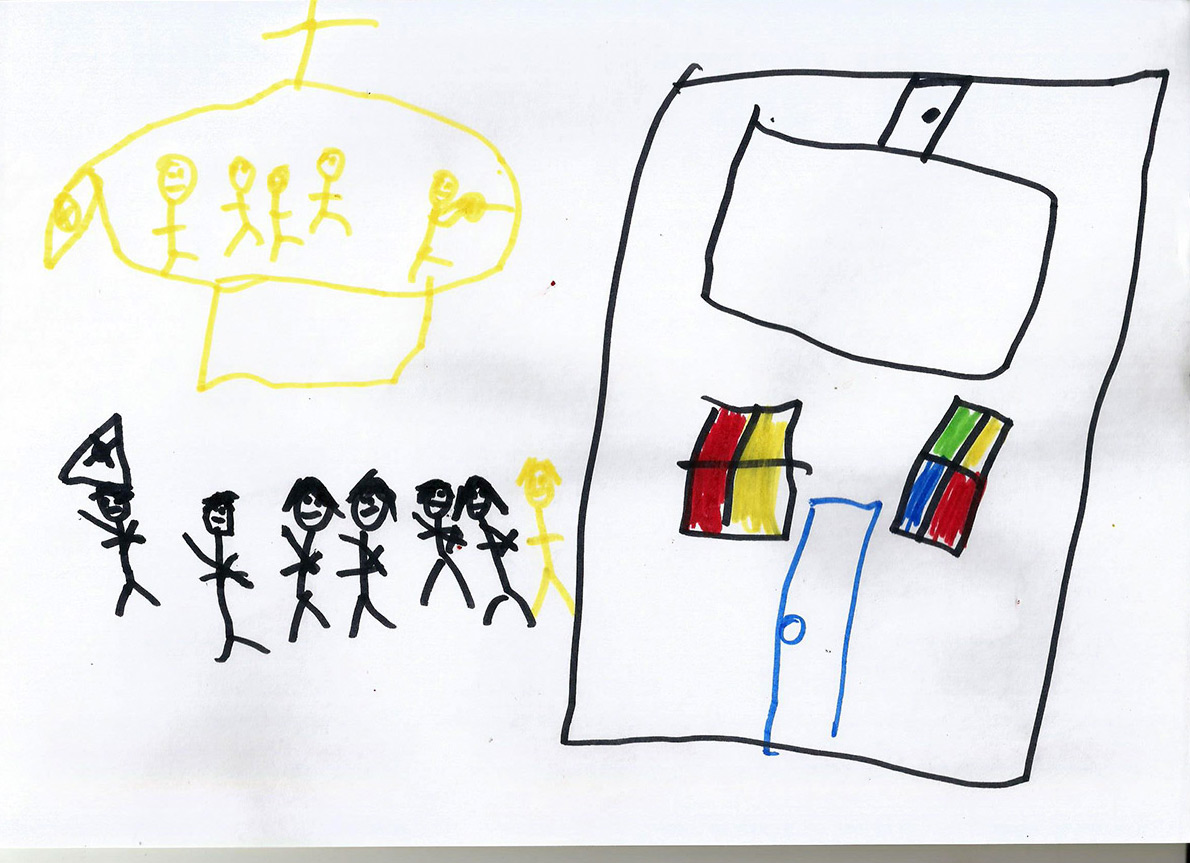In the scope of the project, ten groups (three sessions with each group) in total were studied: Three groups within the age range of 7-9 and 10-12, two groups within the age range of 13-15 with children from Turkey and one group each within the age range of 6-10 and 11-15 with Dom children from Syria. Because Syrian children do not know their exact age and especially children who are in the 6-10 age group were not feeling comfortable about leaving each other, age ranges of Syrian children’s groups are different from those of Turkish citizens’.
Two psychology students who used the research for their master’s thesis and two volunteers of TTM have participated by turns as observers and assistants to the workshops which were facilitated by the psychologist of TTM. Furthermore the TTM art trainer ran painting workshops for 7-9 age groups and poster workshops of all age groups.
The factors that make children feel secure and insecure; make them feel or think positive and negative about the incidents that they face in their daily lives and environments were discussed over the topics determined by them at the workshops. Although each age group discussed in different intensities, mother-father, street, school, other children, media, public transportation and public institutions titles were brought to the table in general.
MOTHER-FATHER
The most prominent ones among the situations that children feel positive and wish for were the times when parents spend time with them, go out together, take care of them and when children help their parents, try to make their parents happy. The last two answers to the question of “What do you like your parents to do?” shows that children think that they need to make their parents happy in order to make themselves happy.

The situations that children feel negative can be counted as when their parents fight, beat them or their siblings, don’t keep their promises, discriminate their children by their genders and don’t pay regard to gender equity, force them to work too much, don’t let them to go out to play, interrupt children, don’t ask children’s opinions/take children seriously, don’t trust their children, behave them harshly.
Another point that attract attention was that children avoided to state negative thoughts about their own parents but implied that they observed those negative situations in other families.
It is never the duty of fathers to provide the safety of children. Because they always beat us, they never listen to us.7-9 age group, II. GROUP SLOGAN WORKSHOP
Siblings were another topic that appeared when we were talking about the parents. Positive behaviors of siblings were mentioned as them sharing their belongings and being supportive in hard situations. Negative behaviors were mentioned as hitting, behaving in a patronizing manner, taking their belongings being without any permission and comfronting with unjust behavior because of them.
STREET
The issues which can be summed under the main title of street are physical structure of the streets and people who are in the street/neighborhood. Trash on the streets; lack of rubbish bins; car traffic; cars parking on the streets; lack of facilities for sports such as tennis, basketball and swimming; lack of play grounds and abandoned or ruinous buildings were among negative physical conditions that every age group pointed out.

The most common comments about the people on the street / in the neighborhood were about tradesmen who price out of the market to foreigners, owners who don’t rent houses to single people, business owners that don’t hire pregnant women, increasing crime rate, not being able to go out without fearing of thieves/dealers/people with guns, bad treatment to Syrian and African people and discrimination at work, neighbor gossips, police forces that throw gas bombs and fire guns and armed conflict. Girls from ages of 13 to 15 complained about irritating situations such as eyeolating or physical and verbal harassment; hearing comments about their clothes and the fact that people who are not pleased with them when they play outside. Girls stated that for not being the subject of any gossip in their social environment, they change the streets which they pass, choose their clothes by considering these facts and even cover their hair.
Don’t park your cars in our playgrounds.10-12 AGES, II. GROUP SLOGAN WORKSHOP
The attributes that they like about their street and neighborhood are sharing within neighbors and the conversations that they make in front of their houses until late hours.
SCHOOL
Under the title of school, positive behaviors stated by children were teachers checking their homeworks, being sincere with children, showing their love in physical ways, giving gifts or saying nice things when they take high grades.
Behaviors that children do not like/do not feel good about were often stated as teachers forbidding physical training class to punish them, making sudden and too many exams, interrupting students, accusing students and not keeping their promises.
Teachers should talk instead of punishing.7-9 AGES, I. GROUP SLOGAN WORKSHOP
Besides these, schools being bad looking and not having opportunities such as changing rooms, laboratories, gym and computer rooms; toilets not being clean and no trash cans, soaps, toilet papers and hygiene materials being provided; class hours being too long and the contents of the classes being too boring; testing system making big pressure on students were other negative points mentioned.
Furthermore children who participated in the workshops shared striking information about violence which is committed by their teachers and students’ own perception of it. Children frequently said that they do not see to slap as a way of violence and children who misbehave deserve getting beaten. They also stated that they feel desperate when they are exposed to violence, because they think that the situation will not change even though they report their teacher; on top of that the teacher will give hard times to them because they report him / her. They mentioned there is no one to report and their parents think that they deserve beating, too.
OTHER CHILDREN
It was seen that peer bullying occupy an important place at children’s agenda.

Children expectations from other children are sharing their belongings, being fare, accepting apologizes when they apologize, being nice/not being rude.
I was bought a new scooter in summer. I was playing and then a Syrian child said “Can I ride, too? I will give you money.” I didn’t want any money and he rode. I think he wants to be my friend.7-9 AGES, II. GROUP FOCUS GROUPS WORKSHOP
Disturbing behaviors which they witness from other children are not asking others’ ideas, not keeping secrets, gossiping, not respecting their privacy, making fun of others’ appearances; discrimination against Syrian and making fun of them; Syrian children carrying knives; children not allowing others to play in their streets.
Children from age of 13 to 15, especially girls often brought up flirting violence and harassment to the agenda.
MEDIA
Negative factors about media were pointed out as sports being focused on football, TV series scenarios consolidating gender roles and censorship on news. Not getting permission from people for social media posts, social media accounts being hacked, violence images in posts and families following their children, especially girls, on social media by using fake accounts.
Children highlighted that internet causes non-communication between people while they demand internet / computer class at school and easy access to internet in house / street.
PUBLIC TRANSPORTATION
Public transportation issue which was brought up by only age group of 13-15 since it became to take part in their daily life was mostly addressed from a negative aspect. First of all because of the explosions which happened recently before the workshops, they expressed that they are afraid of using public transportation. The other topic which they talk about frequently is harassments that they and other women face. Besides it was stated that not all public transportation vehicles are useful for disabled people.
PUBLIC INSTITUTIONS
The only positive example for public institutions is welfare benefits and activities of municipalities. Lack of capacities that public hospitals have, bad and careless treatment from doctors to patients, public institutions not being useful for disabled people, applications that are made to public institutions being ignored or being replied late, bad city planning and municipalities not creating areas for children were some of the negative examples.
